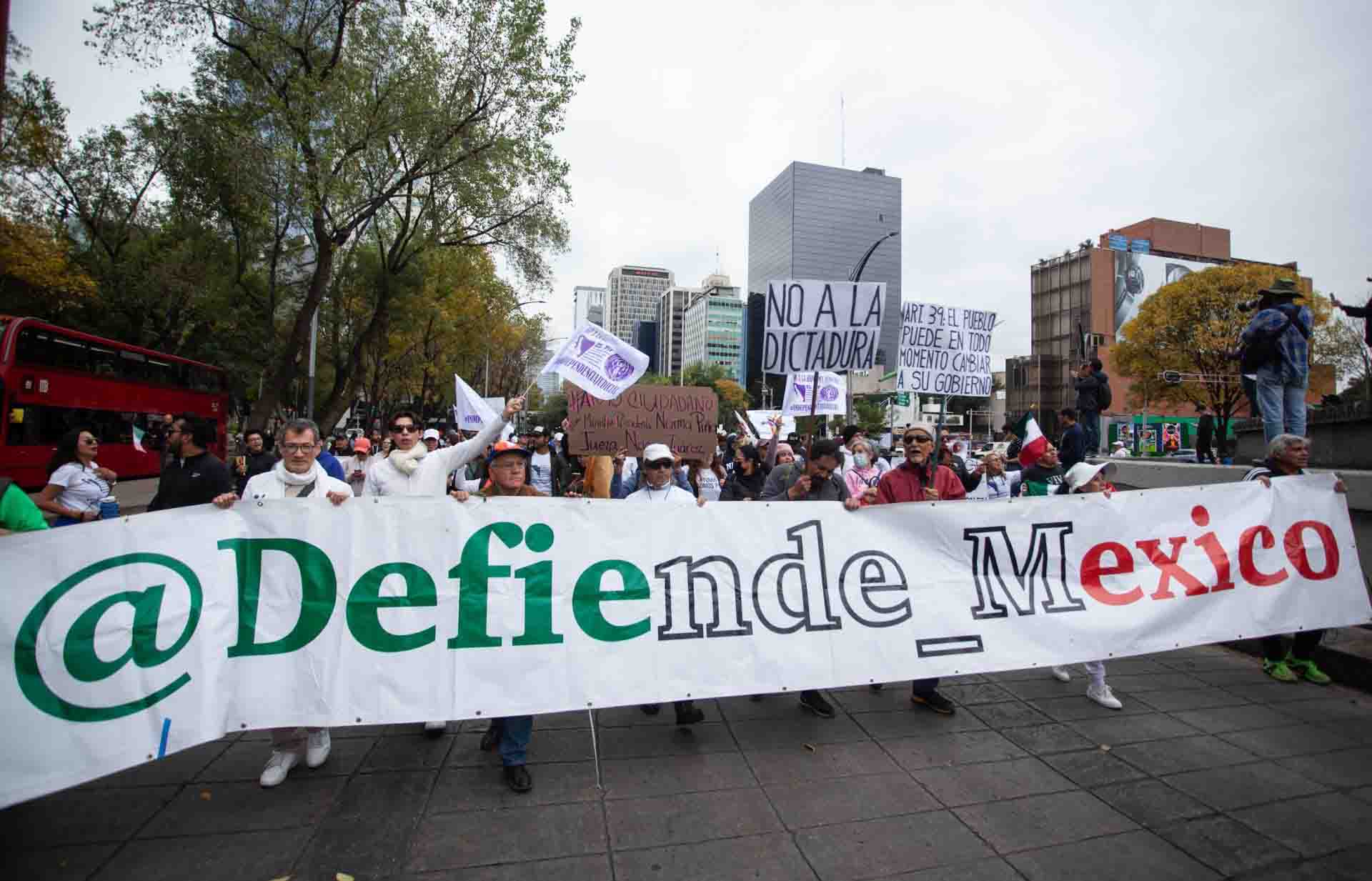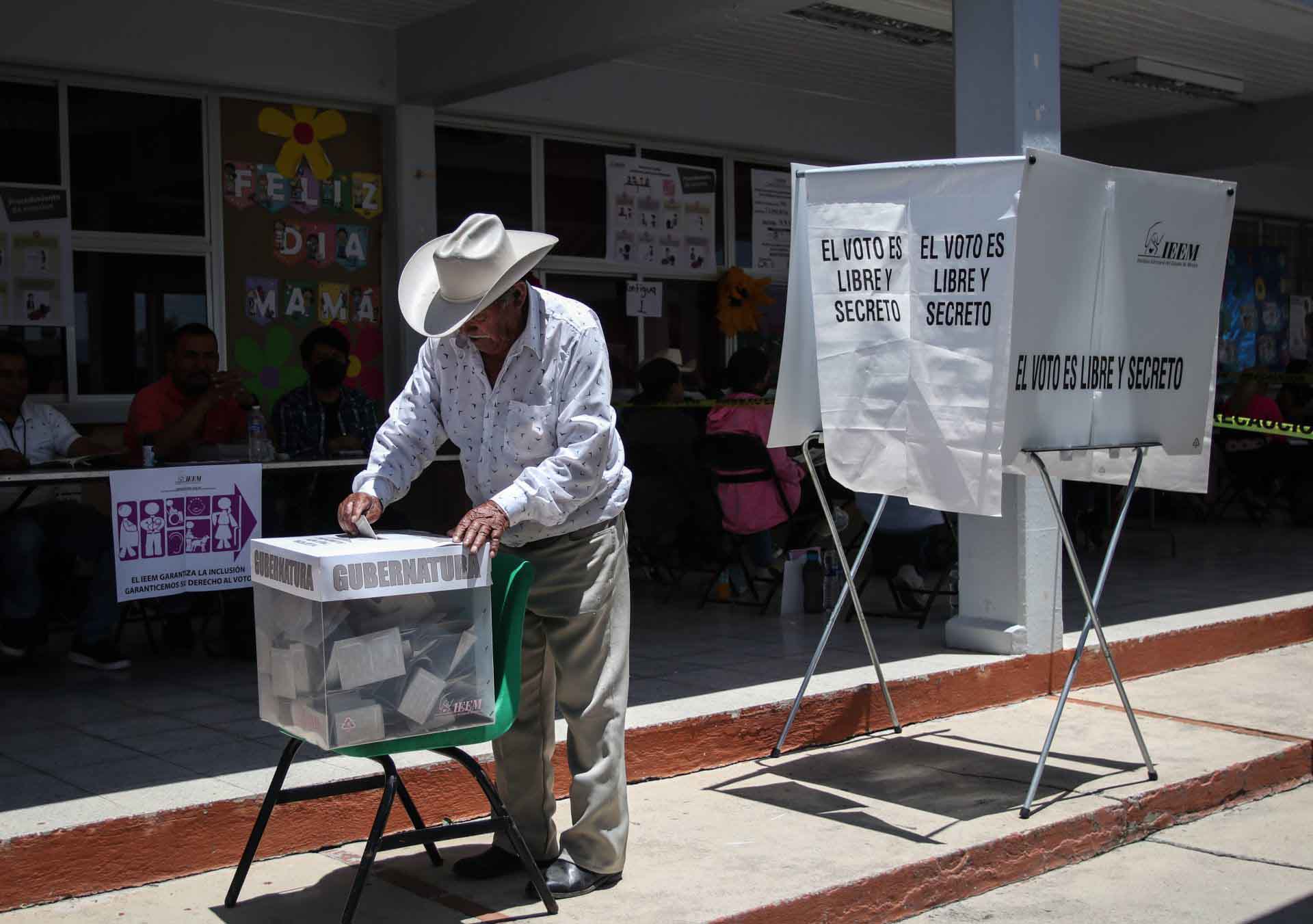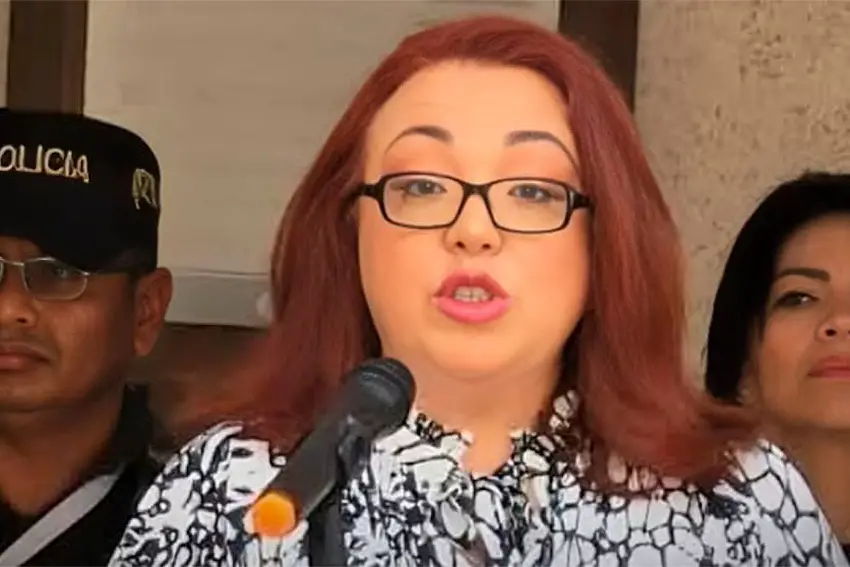President Claudia Sheinbaum asserted Tuesday that the recently enacted judicial reform — which allows citizens to directly elect all judges in Mexico — will be an “example to the world” in how to create a robust judiciary.
“If [there is] something we’re doing in Mexico that is going to be an example to the world — even though they say otherwise at Harvard — [it is] the election of the judicial power. It will be an example because it’s the people choosing their judges, magistrates and Supreme Court justices,” Sheinbaum told her morning press conference.

Her reference to Harvard came in response to remarks made by Mexican Supreme Court Justice Alfredo Gutiérrez Ortiz Mena at a Harvard Law School forum on Oct. 10.
“This is a very dramatic change,” Gutiérrez said at that forum. “At the very least, we will have an enormous period where the courts will not be predictable because all district court judges and all circuit court judges will have to be elected.”
“Now the requirements to be elected … are — and I kid you not — having a 3.0 grade point average — our constitution says that now — and five letters of recommendation from your neighbors. If you meet those requirements, you can be proposed to the Supreme Court, provided you win an election,” he said.
Gutiérrez’s mention of the requirement for judicial candidates to have letters of recommendation from their neighbors elicited laughter from the audience — and his fellow panelists.
Asked on Tuesday what her response to the laughter was, Sheinbaum gave a frank response.
“Nobody should make fun of Mexican men and women,” she said.
Desató risas en Harvard la explicación del ministro Alfredo Gutiérrez Ortiz Mena que, para la elección de jueces, es requisito presentar 5 cartas de recomendación de vecinos.https://t.co/Nfva0XzDo1
Por @Harvard_Law#IndependenciaJudicial#TodosSomosPJF#SiALaCarreraJudicial pic.twitter.com/nxOSuj7cLG
— 3ra Región Asociación Magistrados y Jueces del PJF (@asocmj) October 22, 2024
Mexican Supreme Court Justice Alfredo Gutiérrez Ortiz Mena speaking about Mexico’s judicial reform to fellow panelists at an event hosted by the Human Rights Program at Harvard Law School.
“… It’s up to me to defend my people, my country and my homeland, and all Mexicans as well,” Sheinbaum added.
“The Harvard [Law] School might be very well-known, but it would be good if the Harvard [Law] School did an investigation about the corruption in the Mexican judicial [system],” she said.
The president pointed out that some judges are elected in the United States and emphasized that in some U.S. states, they are even elected “by political party,” a reference to partisan judicial elections.
“We’re going to provide an example to the world with the reform to the judicial power, I’m certain,” Sheinbaum reiterated.
Those elected will be “good, qualified judges,” she said, stressing that there will be an “open, transparent” selection process for judicial candidates.
“… The election of judges is responsible,” said Sheinbaum, who like former president Andrés Manuel López Obrador, has argued that a judicial overhaul is necessary to rid Mexico’s judiciary of corruption and other ills, and to ensure that it is at the service of the majority of Mexican people, rather than an elite minority.
“… We’re building a true rule of law in our country,” she said.
Criticisms of the judicial reform
The main criticism of the judicial reform provision that allows the direct election of judges and Supreme Court justices — from candidates put forward by the president, the Congress and the judiciary itself — is that choosing judges by popular vote will erode the independence of Mexico’s courts and remove a vital check on government power.
Critics of the reform argue that courts could come to be dominated by judges sympathetic to the agenda of the ruling Morena party, which is immensely popular in Mexico, as demonstrated by the June 2 election results. They also contend that investment in Mexico will decline due to a lack of certainty about whether the rule of law will be upheld.

López Obrador submitted the judicial reform proposal to Congress in February, and Sheinbaum expressed full support for it before she was elected in a landslide on the first Sunday in June, allowing her to make the case that the reform is what the majority of Mexicans wanted.
“The people of Mexico took a decision, which was [in favor of] the reform to the judicial power,” the president said Tuesday.
She has rejected claims that the reform will undermine Mexico’s nearshoring opportunities, and told Mexican and U.S. business leaders last week that their investments “are safe in Mexico.”
The first round of judicial elections is slated to take place next year, with a second round to be held at the same time as Mexico’s midterm congressional elections in 2027.
Before the judicial reform was approved, the New York Times reported that “the closest parallel to what Mexico’s [ex-] president is proposing is Bolivia’s experience with electing judges after enacting a new constitution in 2009.”
“But even in Bolivia’s case, the changes didn’t apply to the entire judiciary, focused instead on how some of the most powerful judges can be elected by popular vote instead of being selected by Congress,” the Times said.

“… The experiment in Bolivia has drawn widespread criticism both at home and abroad. Political leaders were able to get judges sympathetic to their views elected to such powerful positions in the judiciary, then used the courts to go after their opponents,” the Times said.
Sheinbaum: Judge who ordered withdrawal of judicial reform decree is ‘breaking the law’
At her morning press conference on Tuesday, Sheinbaum once again spoke about a federal judge’s order to remove from the nation’s Official Gazette of the Federation (DOF) the decree signed by López Obrador last month to promulgate the judicial reform bill.
Four days after she first said she wouldn’t comply with the judge’s order, the president reassserted that Judge Nancy Juárez Salas’ order is invalid.
“For there to be a constitutional reform, it has to be approved by two-thirds of the Chamber of Deputies, two-thirds of the Senate, the majority of state legislatures … and once that occurs, the constitutional change comes. And the Amparo [Injunction] Law says [the court order against the judicial reform decree] is inadmissible,” Sheinbaum said.
“In other words, the Amparo Law can’t be applied against … reforms to the political constitution of the United Mexican States. The judge knows that,” she said.
“… It’s she who is breaking the law. It’s she who is compromising the rule of law. We’re following the constitution. And the constitutional reform was approved as it is,” Sheinbaum said.
“… Look, this is the Official Gazette of the Federation,” the president said as she held up a physical copy of the government bulletin.
“This is how it is — printed. … It’s also published on the internet. … The judge … says remove [the decree]. What does ‘remove’ mean? Do we have to tear out pages from the constitution? Is that what the judge is asking? Mutilate a [copy of the] official gazette?” Sheinbaum asked.
She asserted that “there is no precedent for a judge asking to eliminate” a constitutional reform decree from the DOF.
“What does ‘eliminate’ mean?” Sheinbaum asked. “Do they want us to return to fascism? Burn and break books?”
Sheinbaum said Monday that she hasn’t yet received official notification of the judge’s order and has used the apparent lack of notification to further support her assertion that she is not in contempt of court.
Although she has said that she will not withdraw, remove or “eliminate” the judicial reform decree from the DOF, the president told reporters that she will seek an opinion from the (Morena-dominated) Congress on how to respond to the ruling.
Sheinbaum also said last week that the government would file a complaint against Judge Juárez with the Federal Judiciary Council, while the legal department of the president’s office asked the chief justice of the Supreme Court to direct other federal judges to abstain from issuing any other rulings against the controversial judicial reform.

Judge Juárez defends her ruling
Nancy Juárez Salas, a federal district judge based in Coatzacoalcos, Veracruz, asserted in a radio interview on Monday that — contrary to the government’s view — she does have the right to order the removal of the judicial reform decree from the DOF.
“The argument [Sheinbaum] is using is completely false in terms of saying I don’t have authority and … that a judge can’t be above the people. Here in Mexico, there are three federal powers, each with different authorities,” she said.
“The judicial power is who defends the people from the arbitrary acts of another authority,” Juárez said.
The judge asserted that her ruling is legal because it doesn’t strike down a constitutional reform but is rather a decision against a legislative process.
Juárez issued her order for the judicial reform decree to be removed from the DOF — and thus cancel promulgation — on the basis that the previous government breached a provisional suspension order against its publication.
Indeed, López Obrador promulgated the reform despite a court in Colima ruling against its publication in the government’s gazette.
Juárez said that she was “relaxed” about the ruling she handed down because it was within Mexico’s “legal framework.”
She also said that if the Mexican government doesn’t comply with court orders, there will be “anarchy, where everyone does what he or she wants.”
The judge questioned why the government hasn’t launched a legal challenge against her ruling.
“What really catches my attention is that … the responsible authorities haven’t brought any legal recourse [against it]. … What they should have done due to their nonconformity is exactly that — filed [legal] recourses,” Juárez said.
For her part, Supreme Court Chief Justice Norma Piña said that democracy in Mexico is currently “going through very delicate and very difficult times” as a result of the conflict between the government and the judiciary.
“Human rights are at risk when a power, of any kind, cannot be contained, held back and controlled,” she said.
A constitutional crisis?
Some observers, including legal experts, even claim that Mexico runs the risk of entering a constitutional crisis if Sheinbaum doesn’t comply with Juárez’s order — or future court rulings against the government.
“What [the government] is signaling is that if there is an adverse ruling from the Supreme Court, they won’t comply with that decision. That puts us in a constitutional crisis or on the verge of a constitutional crisis,” said Javier Martín Reyes, a constitutional lawyer and legal academic at the National Autonomous University (UNAM).
“It is not an action in keeping with a democratic government,” he said.
“… I’m only going to comply when I like your ruling, when I believe that it is issued correctly. That’s the message they’re sending,” Martín said.
Juan Jesús Garza Onofre, another UNAM legal academic, said that the president has sent the message that “politics is above the law.”
Tony Payan, executive director of the Center for the U.S. and Mexico at Rice University’s Baker Institute for Public Policy, asserted last Friday that Mexico is already “entering a constitutional crisis.”
Payan wrote on X that Sheinbaum “said she’ll willfully fall in contempt of court after a federal judge orders congressional approval of the dismantling of the judicial branch halted due to legislative procedural violations.”
“So much for the rule of law,” he added.
With reports from El Economista, Aristegui Noticias, El Universal, Reforma, El País, El Financiero and Radio Fórmula
